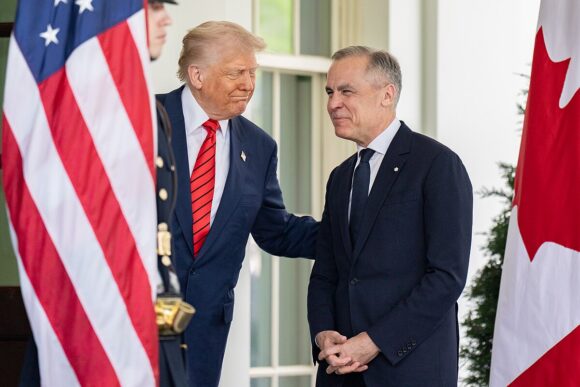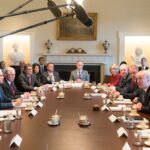Canada has announced it will withdraw a controversial tax targeting major U.S. technology firms, just hours before the first payments were due, in a move aimed at reviving stalled trade negotiations with the United States.
The decision comes after U.S. President Donald Trump abruptly halted talks on a new trade agreement, describing the digital services tax (DST) as a “blatant attack” and threatening to impose higher tariffs on Canadian imports. In response, Canada confirmed on Monday that it would introduce legislation to repeal the tax and suspend collection efforts, which were set to begin that same day.
White House economic adviser Kevin Hassett told Fox News that trade talks between the North American neighbours would now “absolutely” resume following Canada’s reversal.
The DST, announced in 2020, was set to impose a 3% levy on revenue exceeding $20 million generated in Canada by large U.S. tech companies such as Amazon, Meta, Google, and Apple. The tax was retroactive to January 2022 and projected to cost the companies over C$2 billion ($1.5 billion; £1.06 billion) in its first year alone.
Canada’s Finance Minister, François-Philippe Champagne, released a statement confirming the decision to repeal the tax. “The DST was announced in 2020 to address the fact that many large technology companies operating in Canada may not otherwise pay tax on revenues generated from Canadians,” the statement read. It also emphasized that Canada’s preferred path has always been a multilateral agreement on digital services taxation.
Numerous countries, including the United Kingdom, have been reshaping how they tax multinational tech giants, whose global operations often result in low corporate tax obligations due to complex structures. Canada’s DST, part of this global push, was expected to generate C$5.9 billion over five years according to last year’s federal budget.
Trump, in his second term, has cultivated close ties with technology sector leaders and has vocally opposed digital taxes targeting U.S.-based firms. He described Canada’s DST as “egregious,” asserting, “Economically, we have such power over Canada.” U.S. Commerce Secretary Howard Lutnick echoed Trump’s stance in a social media post Monday, thanking Canada for scrapping the tax, which he said would have been “a deal breaker for any trade deal with America.”
The economic stakes are high: Canada sends about three-quarters of its exports—worth over $400 billion annually—to the U.S., while only 17% of American production is destined for Canadian markets.
The American Chamber of Commerce praised Canada’s decision, with president Rick Tachuk stating, “This is a constructive decision that allows both countries to focus on strengthening their economic partnership.”
The tax U-turn follows months of escalating tensions between Washington and Ottawa. Earlier in his current term, President Trump threatened sweeping tariffs on Canada and even made inflammatory comments about annexation, escalating fears over economic instability. The growing hostility played a key role in the political resurgence of Canada’s Liberal Party under former central banker Mark Carney, who reclaimed power amid calls for a more strategic U.S. policy approach.
Despite recent signs of reconciliation, including a joint target to agree new trade terms by 21 July, Canada’s DST remained a persistent thorn in bilateral relations. Dating back to the Biden administration, U.S. officials had repeatedly warned that the tax could provoke retaliatory measures and harm economic cooperation.
Earlier this month, Champagne had indicated Canada would proceed with collecting DST payments from U.S. tech firms regardless of ongoing negotiations—a stance that attracted sharp criticism. Michael Geist, a University of Ottawa law professor and expert on digital policy, lambasted the government’s handling of the DST. In a blog post Monday, he cited missteps including the retroactive nature of the tax and the failure to heed bipartisan warnings from U.S. lawmakers.
Domestic opposition to the DST had also been growing. Canadian business groups expressed concerns that the costs of the tax would ultimately fall on consumers and harm the country’s digital economy.
By reversing course, Canada has not only opened the door to renewed trade negotiations with the U.S. but also signaled a willingness to align its digital tax policy with broader international efforts—though the political and economic implications of the move are likely to resonate for some time.






